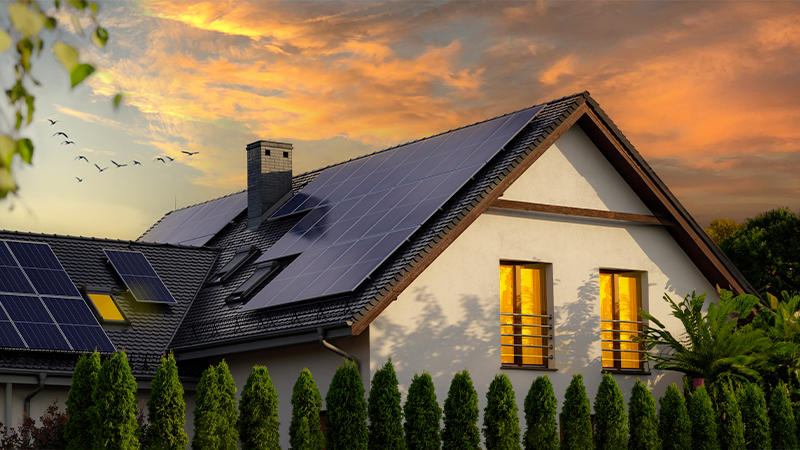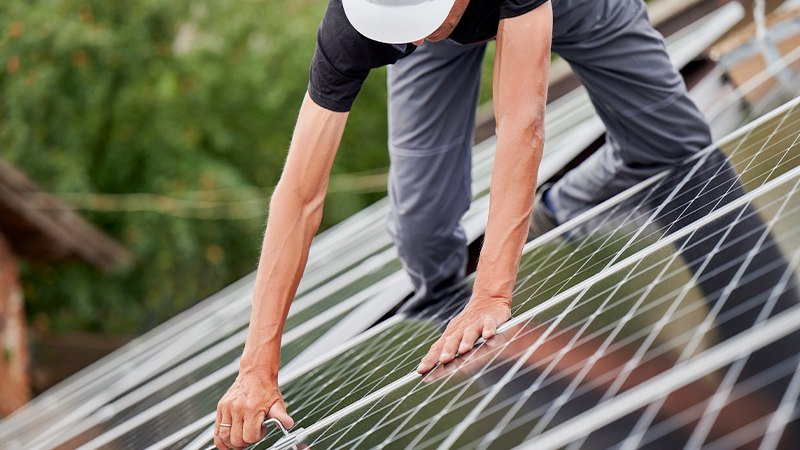Net Metering makes solar more affordable and accessible. It is an excellent cost-saving tool, shortening solar’s payback period. It’s a process where utility companies and solar owners share power. Splitting power production at peak times for the betterment of the community.
If you’ve researched going solar, you’ve probably heard of net metering in passing. If you want to learn more, this article breaks it down very well.
Let’s summarize net metering so we’re all on the same page.
Solar home systems often produce a surplus of electricity during peak sunlight hours. That energy can be stored in a battery backup system or sold to the utility company. Excess power is distributed to the grid, powering your neighbors’ homes while preserving the grid. To ‘return the favor,’ the utility company supplies you with power when your solar system isn’t, like at night.
The word “sold” is misleading. You can’t actually sell power to the utility company for money, but you can exchange power for credit. Think of it as a bank account with energy as the currency. Without solar, you’re simply withdrawing from the account. You’ll have to pay the debt off at the end of the month. With solar, you make deposits during peak hours and smaller withdrawals year-round. Any net savings is rolled over as credit for the next month.
Currently, solar customers in Virginia are credited at the full retail rate (approximately $0.13–$0.16 per kWh). But all that is about to change.
Utility companies across the country are rolling back net metering benefits. If you live in Virginia, then your utility company is either Appalachian Power Company (APCo) or Dominion Energy. Both of them want to reduce the net metering rate by 70%!
Instead of crediting you $0.16 per kWh, they would credit you $0.04— max! All while still charging you the full retail rate for the energy you consume. Instead of being an equal exchange, you’d have to give four kWhs of power just to pay for one kWh!

Why are utility companies changing net metering?
Utility companies claim that solar customers are “subsided” customers— that they shift the cost of electricity onto non-solar customers. So, net metering isn’t fair to everyone else without solar.
If utility companies cared about fair rates and cost-shifting, residential ratepayers wouldn’t be subsidizing the infrastructure costs for industrial customers. Rural ratepayers would pay more than urban ratepayers since rural infrastructure requires more investment per capita.
So why are utility companies cutting net metering? As Will Geise, Regional Director of the Solar Energy Industries Association (SEIA), explains, “This is a tired tactic that utilities have used to maintain their monopoly grip on electricity markets.”
Residential solar actually helps utility companies by preserving the grid.
Solar energy generates surplus electricity during peak daylight hours, which often coincide with periods of high energy demand. Solar energy reduces the overall load on the grid, which is especially important during peak demand when the grid is most vulnerable. Thus, solar provides grid stability and resilience, reducing the potential need for maintenance or repairs.
Even if you don’t have solar panels on your roof, you benefit from your neighbors having solar. This grid stability can also reduce the utility company’s reliance on fossil fuels. Over 50% of Virginia’s electricity is produced from important natural gas. Just like gasoline, natural gas is prone to price fluctuations and market disruptions. Of course, utility companies just pass those prices on to you.

Couldn’t existing residential solar systems get grandfathered in?
As of right now, the new net metering proposals say that existing residential solar will be grandfathered into the old credit exchange. So, if you already have solar and are established with net metering, you’ll continue to enjoy the full retail rate for your extra power.
But don’t expect that to last forever. For example, when Nevada cut its net metering policy, it had to include a grandfather clause. This clause allowed existing solar customers (those who had a solar system by 2016) to remain on the old net metering rules for up to 20 years. But we’re already halfway through that period!
How will cutting net metering impact Virginia?
We can examine other states with reduced net metering policies to glimpse our possible future.
California Public Utilities Commission (CPUC) voted to cut net metering compensation rates by 75% back in December of 2022. By December of 2023, rooftop solar installation had dropped by 80%. This cut prolongs solar’s payback period, discouraging green energy adoption. A survey of solar businesses from the California Solar and Storage Association (CALSSA) found that California lost 17,000 solar jobs in 2023. That’s damage to the state’s economy!
In 2015, Hawaii eliminated net metering to encourage solar customers to invest in batteries. This strategy worked, as 95% of all residential solar systems in Hawaii have a battery attachment. However, solar installations dropped sharply after the change, ultimately slowing solar adoption.
Can a solar battery protect you from net metering changes?
Well, yes and no. Without net metering, a battery becomes almost a necessity.
Many solar installers, including us, offer grid-tied battery backup systems. In this setup, surplus energy is stored in the battery first. If you still produce excess electricity while the battery is full, it goes to the grid. When you need electricity, your home draws from the battery first, then the grid.
This will protect you from a net metering policy stacked against you. But batteries add a significant cost to an already hefty investment. Expect to pay an additional $10,000!
See how net metering makes solar much more affordable and accessible?
That additional battery cost can be included in the 30% Federal Solar Tax Credit program. The Residential Clean Energy Credit (often shortened to just the federal solar tax credit) was a policy initiated under the Biden administration to encourage residential solar. However, that won’t last forever, either. The 30% tax credit is only valid for installations made in the first 10 years (from 2022 to 2032). After 2033, the tax credit percentage will drop to phase the whole program out.
You can help save net metering in Virginia!
Remember when we said Nevada had to include a grandfather clause? They were forced to revise their 2015 net metering proposal after public backlash. Nevada residents united to combat these harmful changes. And they’re not the only ones, either!
A similar story happened in West Virginia. Near the end of 2023, FirstEnergy utilities proposed to change net metering credits from the full retail rate ($0.11 – 0.13) to a “wholesale rate” of $0.066. This proposal was met with public opposition from community members, homeowners, and solar advocates. West Virginia’s Public Service Commission received almost 1,700 comments opposing the proposal. So, they negotiated, reaching a compromised net metering credit of $0.093 per kWh.

What can I do to preserve net metering in Virginia?
There are two things you can do today that will only take a few minutes of your time.
You can submit a public comment to Virginia’s State Corporation Commission. We recommend writing your comment beforehand. Be clear and decisive. You can mention some of the benefits of net metering. Or point out the flaws in the utility companies’ logic.
Go to SCC.Virginia.Gov and scroll down until you see “Submit a public comment about an SCC Case.”
From there, you just need to find the right case, which can be difficult because of SCC’s bureaucracy. So here are the case titles and their numbers.
Petition of Appalachian Power Company for approval to revise its net metering program: PUR-2024-00161. Submit a comment with this link.
Petition of Dominion Energy Virginia for approval of revised Terms and Conditions applicable to interconnection customers and net metering customers: PUR-2024-00211. Submit a comment with this link.
You can contact your local government officials and voice your opinion. You can find your federal, state, and local representatives using USA.Gov’s elected official finder. Again, we recommend preparing what you want to say beforehand. We also recommend reaching out to state-level officials.
Finally, you can partner with or volunteer for nonprofit organizations. Plenty of organizations have experience implementing policy changes. Understandably, this will take more than a few minutes of your time, but donating your time is well worth it for your community.
- Solar United Neighbors (SUN) is a solar advocacy group that is currently campaigning to protect your net-metering rights. We’ve actually worked with them before to achieve Solar Co-ops.
- Power For the People VA follows legislative changes and is a great way to stay up-to-date.
- Sierra Club’s Virginia Chapter does a lot more than just solar advocacy. They are an environmentalist group preserving Virginia’s ecosystems.
- Solar Energy Industries Association (SEIA) is aimed towards solar professionals, but they act as the voice of the solar industry, advocating for solar in several battlegrounds.
Do you want to live under a monopoly? Or do you want to live with energy independence and green freedom?
You could start by sharing this article with people who are also interested in solar. Or you can try to grandfather yourself into the old net metering rate by installing solar within the next few months.
Regardless of when you’re ready for solar, we’ll be here to help! Schedule a site visit and start going solar today!
